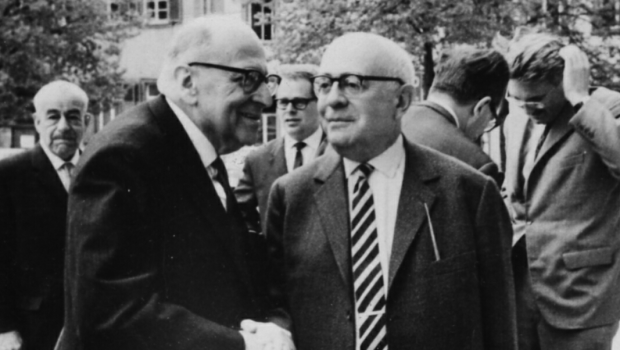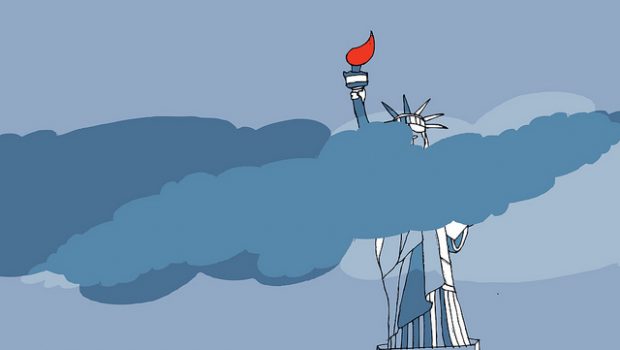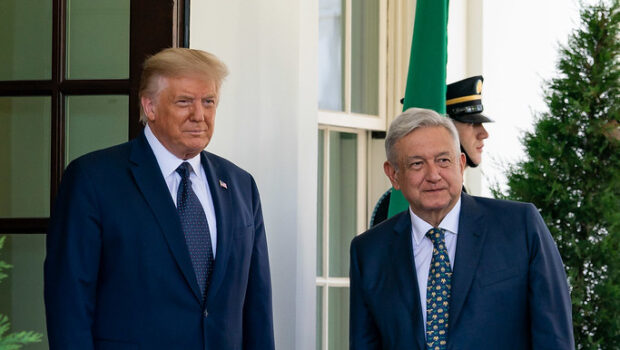The Formation of the European Union (EU) and the Euro
Crisis de la Unión Europea
George Soros
There is a similarity between marital relations and currency. Whatever system prevails, the alternative is more attractive. The EU is a wonderful example of a boom-bust process in politics. It is initially self-reinforcing, but can return and become self-defeating. It is also very involved in the concept of open society because during the period of integration, during its positive development it had a remarkable similarity and relevance to the ideal of an open society because it was led by some far-sighted leaders who realized that all human constructs are imperfect. Karl Popper called it piecemeal social engineering. Probably the most successful example of piecemeal social engineering in human history. Starting with limited goal, setting an agenda, poltical will and a deadline, knowing that that step will not be sufficient. The EC became the EU in a span of 20 years or so. It was led by an ideal of democracy, open society and human rights, a very inspiring idea. It was a self-reinforcing process and the leaders were leading the process of integration. It reached its maximum extent after the collapse of the Soviet Union with German reunification, where Germany recognized reunification can only be done in the context of a strong European union. Germany was the mortar that drove the process and it culminated in the reunification of Germany, the Maastricht Treaty and the introduction of the euro. Then there was a period of digestion and stagnation and it then entered a period of disintegration. That came a few years after the crash of 2008 and that’s where the financial boom-bust process interacted with the political and reinforced it on the downside.
A Single Currency Without the Political Union
The designers of the euro were conscious that it was an incomplete structure. A currency needs a common central bank and a common fiscal policy or a treasury. This was only a monetary union, not a fiscal, not a political union so it lacked those. They knew it was incomplete but they had the expectation that when the time comes you will be able to generate the politicall will to take the next step. The euro had this incomplete structure, the lack of a common treasury. It had other shortfalls of which they were not aware, which have now surfaced. When the time came to take the next step, the political will could not be mustered.
The Shortfalls
They were mixed up with the market fundamentalist beliefs that dominated the economic theory at the time. There was a belief that markets tend toward equilibrium, that the imbalances only arise in the public sector, that the private sector can be left to correct its own mistakes. This turned out to be a fundamental false belief that was at the root of the crash of 2008 and it also affected the situation in Europe. In the crash of 2008 the financial system actually collapsed. It was saved by the authorities by a very delicate maneuver. Credit collapsed and they substituted the credit of the state to make up for private credit. It started in Europe at the end of the IMF meeting in November 2008 the finance ministers left a day early, went to Paris and declared there would be no other systemically important financial institutions allowed to fail, effectively guaranteeing the financial system. The U.S. followed. Angela Merkel, correctly reading political opinion at the time, said we will only guarantee it separately. Each country will have to take care of its own system and guarantee it. That was the first step in the process of disintegration.
The Weakness in the Euro Structure
The markets are not always right, in fact they are often wrong. The first reaction was great relief, and a year later when Greece suddenly revealed their deficit was much bigger –with a new government that wanted to reform and revealed that the previous government had had a bigger deficit —that is when the markets realized the weakness in the euro structure. They were a bit late. Because of this flaw in the construction of the euro, the euro was supposed to bring about convergence of the economies. The ECB accepted the government debt of all the countries equally at the discount window, Spanish, Greek and German bonds could be deposited and considered riskless so you could borrow 100% of the face value from the central bank. At that time Italian bonds, Spanish bonds which paid a few more percent than German, German and French banks rushed in and bought Spanish bonds instead, and that’s the beginning of the euro crisis because they used the interest rate differential. The convergence in interest rates created a divergence in economic performance. Germany had to carry the burden of reunification, which came with a big increase in public debt because it had to spend so much on East German debt and subsidies and therefore German industry tightened and cooperated so Germany greatly increased its efficiency and competitiveness. At the same time, the reduction in the ability to borrow cheaply created a housing boom in Spain, Italy and other countries like Ireland. They continued to operate their fiscal policies soundly but there was a tremendous expansion in borrowing on real estate. We had a boom and those countries as a result became less competitive. The convergence of interest rates created a divergence in competitiveness.
The Crisis and The Political Union
This is primarily a banking crisis and a government debt crisis but the two are interconnected and reinforce each other. There is a third crisis which is a political one because there is a process of disintegration. The euro crisis has the potential to destroy the cohesion of the EU. It is a real threat to the political union. This negative dynamic came into play because the leadership, once the process of disintegration started, stopped moving forward and wanted to preserve the status quo because any step would accelerate disintegration. They stuck to it as if it were immutable yet it was constructed knowing it would need change. The status quo as untenable or intolerable was pushed into an anti-European Union posture.
German Leadership
The authorities saw no solution for the euro and the Greek crisis came because they could not go to a fiscal union. The political will was not there in the heyday of the EU. It was impossible to advocate any thing like a common treasury. They wanted to buy time. When There is a financial crisis, buying time very often works. The markets calm down and the resources used help to create a profit and values that are depressed come back to normal. This time however, time worked against the authorities because of the political dynamic. By buying time reluctantly the authorities always acted doing too little, too late. It made the crisis grow. It was a relatively small Greek problem. Had they done earlier what they are willing to do now, the Greek crisis could have been easily contained. But at first they offered support at penal interest rates and Greek debt became unsustainable. There has to be a reorganization of the debt. They were kicking the can down the road but they came to the end of the road. Then came the EFSF. An embryo of a common treasury. It was then declared by the German constitutional court that it is okay but no further steps of delegating powers can be accepted. Every delegation of powers has to be approved by the Bundestag. So far, but no further. Germany is clearly in the driver’s seat. Germany is now dictating the economic policy for Europe and doing it reluctantly. It is something it wanted to avoid because of its history. Being the most efficient, largest and most successful economy with the best credit, it was pushed into this role. They are unfortunately advocating the wrong policy. They say Germany is successful so every other country should be like Germany. Germany is a chronic creditor but not every country can be that, there must be chronic debtors.
There has been a substantial change in the attitudes of the German leadership. They realized they have made a mess of it. They are determined to save the euro. They are right to do so. They have no choice. The euro exists. It is imperfect. But you cannot unscramble the omelet. The assets and liabalities of the financial system and economy are so intermingled based on the common currency that we cannot undo it. We would not know who is broke and who is not. We would have a financial meltdown.
To Save the Euro
There has been a change, there is a desire to do the right thing and unfortunately, they are not doing the right thing. I have to be rather blunt about it, even though it is not a good thing to paint a dark picture. They have to face reality and then they can remedy it. The fact they are still doing the wrong thing does not mean gloom and doom. They can still get it right. The longer they wait and the further they go the bigger the cost. Right now we are at a crisis point and what they are doing is again too little, too late.
I have to explain that there is a right way. I must express my frustration because I have both privately and publicly outlined the right way and I believe it would have been adequate. It can still be adequate tomorrow. There is a way to solve the problem but it may be very costly. First, they have to calm the markets. For that they need two things, leadership – the authorities must be united –and have adequate resources to carry out the plan behind which they are uniting. As it is, they are not united and the resources cannot be stretched because they want to recapitalize the banks and provide a guarantee for the sovereign bonds that will bring down interest rates and those are the wrong things to do. The way they should do it is not to recapitalize the banks now, when the shares are at a discount to asset values and the asset values are low because the bonds they hold are below cost. What they should have done is to use the EFSF to guarantee the banking system against failure and in exchange get the banks to follow their instruction which would be not to reduce their balance sheet which is what they are doing now, maintain their loan portfolio and credit lines, put in inspectors that ensure they do not take risks for their own account that would endanger them. Then the second step would be to encourage Italy and Spain to issue treasury bills, reduce the interest rate to at least half a percent by the ECB, encourage Italy to borrow short-term only and encourage the banks to hold their liquidity by holding treasury bills which is as good as cash and yields more than assets they maintain at the central bank. That would enable them to borrow and suddenly everything would be very different. That would have worked.
Greece and The Euro Zone
The Greek debt has to be reduced and there is pressure to have a voluntary reduction, a haircut of 50%. This only applies to private sector, so it only reduces the debt of Greece by 20% and that is not enough. The ECB is dead set against this because they bought a lot of Greek bonds and own them and they would suffer a loss. They did it pushing the envelope, trying to save the financial system. The constitution of the central bank only allows them to maintain the stability of the currency but it is the normal role of a central bank to try to preserve the financial system. The solvency risk they took should have been taken by a treasury but it did not exist. The EFSF should have taken over Greek bonds from the IMF and also reduced the debt burden on Greece . They would have given Greece a chance to work its way out of the debt crisis. That was the other opportunity that was missed. There is a real danger of a disorderly default. It is a real danger. A scheme like this could still be the solution. There has to be a voluntary or involuntary reorganization but it has to be done in an orderly way and particularly the greek banks have to be kept alive and the depositors have to be protected because if you do not there is liable to be a run on the banks in other countries as well. This is a danger of a meltdown and it is real but it can be avoided. That leads me to the other unsolved problem. If all countries are indulging in austerity and you have a number of countries that have to go into internal devaluation within the euro system by reducing wages and prices, that sets up a deflationary pressure and the debt burden is a ratio between accumulated debt and GNP and if by austerity you reduce expenditures but you also reduce GDP your debt burden actually grows. This is a trap that is the opposite of a bubble. It is a black hole. If one country does it, they can readjust but if every country does it you get a depression. That is what is facing the European Union even if you contain the financial crisis. The next job is to find a way to stimulate the European economy as a whole. Given the legal constraints that apply to Germany, this can only be done on a European level. That would be the next step after the Greek crisis is under control.
The Need To Recreate Political Will for a Common Europe
There is a need to reinvent the European project. For better or worse the euro is here to stay. You cannot do without it. But that leads to forcing people to live together, a short-term marriage that does not lead to domestic harmony. There has to be something positive. There was something positive about Europe and there still is, it has to be rekindled on the political level. A common project like green growth is a positive goal for getting that process going.
Occupy Wall Street movements?
I am on record as expressing sympathy with the feelings of the people occupying Wall Street because they are victims of mistaken policy and a misfunctioning financial system. It is an expression of frustration, a legitimate expression. The trouble is, reality is very complicated. People look for simple answers and especially in moments of stress and fear, everybody is trying to advocate his own self-interest and yet the European project requires cooperation. Cooperation is something you can achieve in times when there is hope and a functioning leadership and at the moment you do not have that. Particularly the role of misconceptions and lack of understanding has been shaping history.
Traducido al español por Tanya Huntington Hyde
La formación de la Unión Europea (UE) y el Euro
El proyecto de la Unión Europea (UE) ha sido un ejemplo claro de proce- so político de expansión-recesión. En su origen, las iniciativas se soste- nían por sí mismas, aunque existía el peligro de que pudieran revertirse transformándose en algo contraproducente. En varios aspectos, se trabajó muchísimo en el concepto de una sociedad abierta. Así, durante el periodo de integración –el de un desarrollo positivo–, se logró una coincidencia notable en términos de conceptualización ideal de esa sociedad dado que el proyecto fue guiado por algunos líderes visionarios, quienes advirtieron que cualquier constructo humano, forzosamente, sería imperfecto. Karl Popper hablaba de una ingeniería social poco sistemática y ése es, probablemente, el ejemplo más exitoso de este tipo de ingeniería en la historia. Partiendo de una meta bien delineada, se estableció una agenda, una voluntad política y una fecha límite a sabiendas de que, con esos pasos simples, no sería suficiente. No obstante, la Comunidad Económica Europea se convirtió en la UE en un lapso de 20 años, aproximadamente, encabezada por los ideales de sociedad abierta, democracia y derechos humanos: una serie de conceptos muy estimulantes.
Tras el colapso de la Unión Soviética, la UE alcanzó su mayor ex- pansión con la reunificación de Alemania una vez que ésta reconoció que su futuro sólo podía lograrse en el contexto de una unión euro- pea fuerte. De modo que Alemania fue el motor que impulsó dicha iniciativa hasta culminar con su reunificación, el Tratado de Maastricht y la introducción del euro. Después vino una etapa de asimilación y posterior estancamiento, antes de ingresar a un periodo de desintegración tras la crisis de 2008. El proceso financiero de expansión- recesión interactuó con el proceso político, reforzando su declive.
Una sola moneda sin unión política
Los que diseñaron el euro estaban conscientes de que era una es- tructura incompleta. Una moneda necesita un banco central común, además de una política fiscal y una hacienda comunes. Por lo tanto, aquello fue sólo una unión monetaria –no fiscal ni política; la sabían incompleta pero esperaban que, llegado el momento, se generaría la voluntad política necesaria para dar el paso siguiente. El euro, sin embargo, enfrentó otros escollos de los cuales no estaban conscientes. Y cuando llegó el momento de pasar a otro nivel, no lograron reunir la voluntad política necesaria.
Escollos
Los obstáculos se mezclaron con las creencias fundamentalistas que dominaban la teoría económica de aquel entonces. Existía la creencia de que los mercados tienden hacia un equilibrio y que los desajustes
se presentan únicamente en el sector público. Esta creencia fundamen- talmente falsa estuvo en la raíz de la crisis del 2008, la que repercutió también en Europa. El sistema financiero se colapsó realmente durante esa crisis. Las autoridades salvaron la situación mediante una maniobra muy delicada. Tras haberse desplomado, el crédito privado fue sustitui- do por préstamos del Estado. Todo comenzó en Europa en noviembre de 2008, al término de la reunión del FMI. Los ministros de esta reunión se fueron un día antes hacia París, en donde declararon que no permi- tirían más la falla sistemática de instituciones económicas importantes, lo que garantizaba, en esencia, al sistema financiero. Estados Unidos siguió el ejemplo. Sin embargo Angela Merkel –dando una lectura ade- cuada a la opinión política del momento– señaló que sólo concederían apoyos por separado. Cada país tendría que cuidar y garantizar su pro- pio sistema. Ese fue el primer paso hacia un proceso de desintegración.
La debilidad estructural del euro
Los mercados no siempre tienen razón. De hecho, se equivocan con mucha frecuencia. La primera reacción fue de alivio, pero un año después, cuando Grecia reveló súbitamente que su déficit era mucho mayor –y con un nuevo gobierno queriendo efectuar reformas–, los mercados se volvieron conscientes de la debilidad estructural del euro. Aunque ya era un poco tarde. Debido a esa falla en su construcción, se dio por sentado que el euro lograría la convergencia de las econo- mías. El Banco Central Europeo recibía la deuda pública de todos los países por igual, en la misma ventanilla. Los bonos españoles, griegos y alemanes podían depositarse y considerarse fuera de riesgo, por lo que era factible pedir un préstamo al cien por ciento del valor nominal. En aquel momento, los bonos italianos y españoles rendían un porcentaje ligeramente mayor que los alemanes. Así, los bancos franceses y alemanes se lanzaron a comprar bonos españoles por encima de cualquiera de los otros. Este fue el comienzo de la crisis del euro ya que el hecho significó que algunos especularan con el diferencial de las tasas de interés. Finalmente, la convergencia en dichas tasas creó una divergencia en el desempeño económico. Alemania tuvo que sostener la carga de la reunificación, lo que implicó un gran aumento del gasto público –hubo que saldar la deuda de Alemania Oriental y mantener los subsidios y, en ese contexto, la industria alemana se ciñó y cooperó. Esa fue la razón por la que Alemania incrementó muchísimo su eficiencia y competitividad. A la vez, su reducción en la capacidad de obtener préstamos baratos creó un boom de vivienda en España, Italia e Irlanda. Estos países continuaron manejando sus políticas fiscales de manera sólida, pero experimentaron una tremenda expansión de sus préstamos en el sector de bienes raíces. Tuvieron un boom pero, como resultado, se volvieron menos competitivos. La convergencia de las tasas de interés creó una divergencia en cuanto a competitividad.
La crisis y la unión política
Ésta es principalmente una crisis bancaria y de deuda pública, pero ambas están interconectadas y se retroalimentan. Ahora bien, existe un tercer elemento: la crisis política debida al proceso de desintegración. Los problemas del euro tienen el potencial suficiente como para destruir la cohesión de la UE. Constituyen una amenaza real. La diná- mica negativa entró en escena cuando sus líderes, una vez detectado el peligro de desintegración, dejaron de moverse hacia adelante tra- tando de preservar el statu quo: cualquier paso aceleraría su división. Todos se ciñeron a la estructura como si fuera inmutable a pesar de que fue construida a sabiendas de que necesitaría cambios. El statu quo insostenible e intolerable fue transformado a empellones hasta propiciar una postura anti-Unión Europea.
Liderazgo alemán
Las autoridades no encontraron salida para el euro y la crisis griega arribó en la medida en que no pudieron llegar a unión fiscal algu- na. Durante el auge de la UE la voluntad política se ausentó y fue imposible abogar por algo así como una tesorería común. La UE intentaba comprar tiempo. A menudo, cuando irrumpe una crisis financiera comprar tiempo funciona: los mercados se estabilizan y los recursos ayudan a crear rentabilidad; asimismo, los valores que se ha- bían deprimido vuelven a su estado normal. Sin embargo y debido a la dinámica política, en esta ocasión el tiempo no favoreció a las autoridades. Actuaron poco y demasiado tarde, lo que repercutió en un incremento mayor de la crisis. Al inicio, se trataba de un problema griego relativamente menor, y si hubieran efectuado antes lo que ahora están dispuestos a hacer, la crisis podría haberse contenido fácilmente. Sin embargo, como desde el principio ofrecieron un apoyo con tasas de interés punitivas, la deuda griega se volvió insostenible. Ahora deben realizar una reestructuración completa. Dejaron pasar el tiempo y entraron pronto a un callejón sin salida. Fue hasta entonces que surgió la propuesta de un Fondo Europeo de Estabilidad Financiera (FEEF), especie de hacienda común embrionaria. Sin embargo, una corte constitucional alemana declaró de inmediato su acuerdo con la advertencia de que no aceptarán mayores pasos en la delegación de poderes. Cada acto en este sentido tendría que ser aprobado por la Bundestag. Hasta allí –y no más. Evidentemente, Alemania estaba al volante. Hoy está dictando la política económica de Europa aunque lo hace a regañadientes. Se trata de algo que quería evitar, teniendo en cuenta su historia. Pero siendo la economía más eficiente, grande, exitosa y con el mejor crédito, estuvo obligada a asumir ese papel. Desafortunadamente, hoy está propiciando la difusión de una política equivocada. Ha tenido éxito, así que el resto de los países quieren ser como ella. Alemania es un acreedor crónico, pero no todos los países pueden ser así. Debe haber deudores crónicos también.
Hoy ha sucedido un cambio fundamental en el liderazgo alemán. Se han percatado de sus errores. Ahora asumen la determinación de salvar al euro, y tienen razón en hacerlo. No les queda de otra. El euro existe, aunque imperfecto, y no pueden deshacer su omelet. Los activos y pasivos del sistema financiero y de la economía están tan entremezclados, basados en una moneda común, que no podemos desmembrarlos. No sabríamos quién está quebrado y quién no. Tendríamos un colapso financiero.
Para salvar al euro
Existe el deseo de hacer lo correcto aunque, desafortunadamente, no está sucediendo nada al respecto. Debo ser franco, pese a que no sea aconsejable pintar todo de negro. La UE tendrá que encarar la realidad, hasta entonces podrá remediarla. El hecho de que continúen por el camino equivocado no significa que habrá una debacle: las cosas aún pueden salir bien. Pero mientras esperen más, mayor será el costo. En este momento estamos en el punto agudo de la crisis y lo que están resolviendo es, de nuevo, demasiado poco y a pasos lentos. Quiero insistir en que sí existe un camino correcto. Tanto en público como en privado he trazado un esquema de lo que creo que habría sido el camino oportuno. (Aunque mañana seguirá siendo pertinen- te). En primer lugar, hay que tranquilizar a los mercados. Para ello se necesitan dos cosas: un liderazgo –las autoridades deben unirse– y los recursos necesarios para poder ejecutar un plan de rescate. Tal y como están las cosas, no existe unidad alguna y los recursos no pueden estirarse más debido a que la UE está intentando recapitalizar los bancos y garantizar aquellos bonos soberanos que disminuirían las tasas de interés. Y esto es, precisamente, lo que no deben hacer. No es momento de recapitalizar las instituciones bancarias cuando las acciones están a la baja comparadas con el valor de los activos; asimis- mo, el valor de éstos se encuentra en picada gracias a que los bonos que respaldan están por debajo de su costo real. Lo que debieron hacer fue utilizar el FEEF para garantizar el sistema contra el desplome y, por otra parte, conseguir que los bancos siguieran sus instrucciones en el sentido de no reducir su balance general –que es lo que están haciendo ahora–, mantener sus líneas de crédito y portafolios de prés- tamos colocando a inspectores encargados de evitar riesgos. Una vez aseguradas estas medidas, los siguientes pasos serían alentar a Italia y España para que emitan bonos del tesoro, reduciendo la tasa de interés al menos hasta medio punto porcentual a través del BEC; alen- tar a Italia para que sólo asuma préstamos a corto plazo y, asimismo, convencer a los bancos de que mantengan su liquidez respaldando a los bonos del tesoro. Esto les permitiría tomar créditos y, de pronto, todo el panorama cambiaría. Eso habría funcionado.
Grecia y la zona euro
La deuda griega debe reducirse y se está presionando para que sea de manera voluntaria (necesitan un recorte del 50 por ciento). El plan se aplicaría sólo al sector privado y, con ello, la deuda se reduciría apenas un 20 por ciento –lo que no es suficiente. El Banco Central Europeo está empecinado en que la operación no se realice ya que él compró gran cantidad de bonos griegos y, por lo mismo, sufriría pérdidas. Han llegado hasta los límites con tal de salvar el sistema financiero. La constitución del Banco Central sólo le permite mantener la estabilidad de la moneda; sin embargo, el papel normal de un banco central es conservar íntegro el sistema financiero. El riesgo de solvencia que tomaron lo debió asumir una institución de hacienda, pero ésta no existe. Al FEEF, por su parte, le correspondía asumir los bonos griegos del FMI y, asimismo, reducir la carga de la deuda de aquel país. Pero se perdió esa oportunidad. Ahora existe el peligro real de incumplimiento de pagos. No obstante, un esquema como el que acabo de mencionar aún podría ayudar. Pero tiene que haber una reorganización, voluntaria o involuntaria pero de manera ordenada. En particular, deben mantener a flote los bancos griegos y proteger a los cuentahabientes, porque si no, lo más probable es que haya también una estampida bancaria en otros países. El peligro de un colapso es real, pero puede evitarse. Ahora bien, hay otro problema que no se ha resuelto. Si todos los países están asumiendo planes de austeridad y tenemos a cierto número de ellos con una devaluación interna (que afecta al sistema euro mediante la reducción de sueldos y precios), la presión deflacionaria se incrementa y la carga de deudas se vuelve una relación entre deuda acumulada y PIB. Y si debido a esta austeridad se reducen gastos pero también el PIB, la carga de deuda terminará por crecer. Se trata de una trampa con características muy diferentes a las de una burbuja. Es más bien un hoyo negro. Si lo hace un país, puede haber un reajuste; pero si lo hacen todos, lo que tenemos es una depresión. Esto es lo que enfrentará la Unión Europea, aun si logra contener su crisis financiera. El siguiente reto consistirá en hallar la manera de estimular la economía de Europa entera. Dadas las restricciones legales que se aplican en Alemania, ésto sólo puede lograrse al nivel europeo.
Recrear una voluntad política para una Europa común
Lo cierto es que se necesita reinventar el proyecto europeo. Para bien o para mal, el euro no se irá a ninguna parte. Ya no podemos prescindir de él. Esto nos lleva a obligar a la gente a convivir en una especie de matrimonio a corto plazo que no desembocará, necesariamente, en la armonía doméstica. Ya hubo antes algo positivo en Europa, y sigue existiendo; hay que reactivarlo ahora en el nivel político. Un proyecto común, como el Crecimiento Verde [Green Growth], sería una meta positiva para adelantar en este proceso.
*Conferencia copatrocinada por la Central European University y el Institute for New Economic Thinking.










